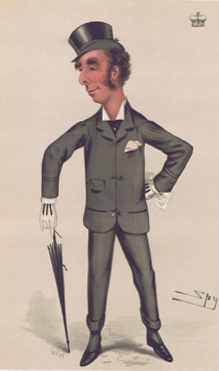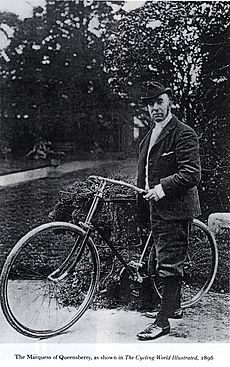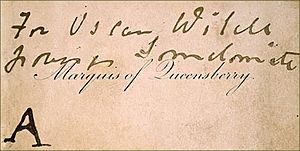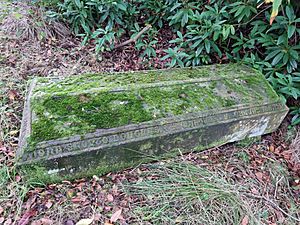John Douglas, 9th Marquess of Queensberry facts for kids
Quick facts for kids
The Most Honourable
The Marquess of Queensberry
|
|
|---|---|
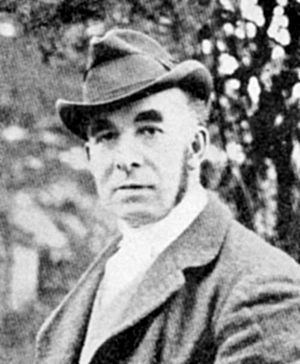
Lord Queensberry in 1896
|
|
| Born | 20 July 1844 Florence, Grand Duchy of Tuscany, Italy |
| Died | 31 January 1900 (aged 55) London, England |
| Tenure | 6 August 1858 – 31 January 1900 |
| Spouse(s) |
Sibyl Montgomery
(m. 1866; div. 1887)Ethel Weeden
(m. 1893; annulled 1894) |
| Issue | Francis Douglas, Viscount Drumlanrig Percy Douglas, 10th Marquess of Queensberry Lord Alfred Douglas Lord Sholto Douglas Lady Edith Douglas |
| Parents | Archibald Douglas, 8th Marquess of Queensberry Caroline Margaret Clayton |
| Member of the House of Lords Lord Temporal |
|
| In office 6 August 1858 – 31 January 1900 Hereditary Peerage |
|
| Preceded by | Archibald Douglas, 8th Marquess of Queensberry |
| Succeeded by | Percy Douglas, 10th Marquess of Queensberry |
John Sholto Douglas, the 9th Marquess of Queensberry (born 20 July 1844 – died 31 January 1900), was an important British nobleman from the Victorian era. He is best known for his strong beliefs, his role in creating the "Queensberry Rules" for modern boxing, and his connection to the famous writer Oscar Wilde.
Contents
Biography of John Douglas
John Douglas was born in Florence, Italy. He was the oldest son of Archibald Douglas, 8th Marquess of Queensberry, a politician, and Caroline Margaret Clayton. He had three brothers and two sisters.
When his father passed away in 1858, John inherited the title of Marquess of Queensberry. He studied on naval training ships and served in the Royal Navy until 1864. Later, he was a Lieutenant-Colonel in the 1st Dumfriesshire Rifle Volunteers.
In 1864, Lord Queensberry attended Magdalene College, Cambridge. He left after two years without finishing his degree. He was very good at sports, playing cricket and enjoying running, hunting, and steeplechasing.
He married Sibyl Montgomery in 1866. They later divorced, but she lived to be 90 years old. Queensberry married Ethel Weeden in 1893, but this marriage was ended the next year.
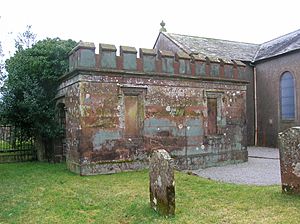
Queensberry sold Kinmount House, the family home in Scotland. This action caused more disagreements with his family. After his death, his ashes were buried at Kinmount in the Douglas Mausoleum.
His oldest son, Francis, died unmarried and without children. Because of this, John's second son, Lord Percy Douglas, became the next Marquess. His third son, Lord Alfred "Bosie" Douglas, was a close friend of the famous author Oscar Wilde.
Queensberry's Impact on Sports
Queensberry loved sports and was a big fan of boxing. In 1866, he helped start the Amateur Athletic Club. This was one of the first groups that allowed amateur athletes from all social classes to compete.
The next year, this club published a set of twelve rules for boxing matches. These rules were created by John Graham Chambers. However, they became famous under Queensberry's name and are known as the "Queensberry Rules." These rules eventually became the standard for boxing around the world.
He also helped bring association football (soccer) to Scotland. In 1868, he formed his own team called Kinmount and was its captain. They played against the Annan N.B. team.
Queensberry was also a skilled rider. He enjoyed fox hunting and owned several successful racehorses. He won his first race in 1865 and his last in 1883. He was part of the National Hunt committee, which oversees horse racing. He recovered from several serious injuries during his riding career.
Queensberry's Political Views
In 1872, Queensberry was chosen by the Scottish nobles to be a representative peer in the House of Lords. He served until 1880. At that time, he was nominated again but refused to take the traditional religious oath to the Queen.
Queensberry was known for his strong non-religious beliefs. He stated that his word should be enough, and he would not take a religious oath. Because of this, he was not allowed to take his seat in parliament. Another person, Charles Bradlaugh, also faced a similar issue in the British House of Commons.
This situation caused a stir, and the Prime Minister, William Ewart Gladstone, later apologized. Bradlaugh was eventually allowed to take his seat, but Queensberry was never again sent to parliament by the Scottish nobles.
In 1881, Queensberry became president of the British Secular Union. This group promoted non-religious views. He also wrote a long poem called The Spirit of the Matterhorn in 1873, explaining his beliefs. In 1882, he was removed from a theater performance. He had loudly interrupted a play by Alfred, Lord Tennyson because it showed a character with non-religious views in a negative way.
Queensberry's outspoken views and his connection to the boxing world made him unpopular with some people in London's high society. In 1893, his oldest son, Francis, was given a special title that allowed him to sit in the House of Lords. Queensberry was unhappy that his son could be in a chamber that had refused him. This led to a disagreement between him and his son.
Dispute with Oscar Wilde
In February 1895, Queensberry was upset by his son Alfred's close friendship with Oscar Wilde. Queensberry left a message for Wilde at his club. Wilde then decided to take legal action against Queensberry.
The trial began on 3 April 1895. Queensberry won the case against Wilde. Wilde was left without money, and his belongings were sold to pay for Queensberry's legal costs.
After the trial, the information gathered by Queensberry's investigators was sent to the police. This led to Oscar Wilde being charged and found guilty of certain actions. He was sentenced to two years of hard labor. After his release, Wilde moved to France, and his health and public image were greatly damaged.
Queensberry passed away on 31 January 1900. Oscar Wilde died ten months later in Paris.
Queensberry in Movies and TV
Queensberry has been played by several actors in movies and TV shows about Oscar Wilde and Alfred Douglas. Some of these actors include:
- Edward Chapman in the movie Oscar Wilde (1960).
- Lionel Jeffries in the movie The Trials of Oscar Wilde (1960).
- Tom Wilkinson in the movie Wilde (1997).
He also appears as a cartoon character in the show Mike Tyson Mysteries, where he is voiced by Jim Rash.
Images for kids
 | James Van Der Zee |
 | Alma Thomas |
 | Ellis Wilson |
 | Margaret Taylor-Burroughs |


